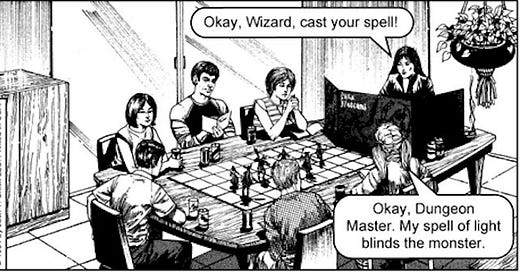Christianity and roleplaying games have a somewhat rocky relationship with each other. The Satanic Panic looms large in our cultural memory with many older Christians still viewing fantasy RPGs as an avenue for Satan and many gamers viewing Christians as judgemental hypocrites. My own story involves a little bit of this with my mother trying to keep me from gaming. However, I've recently discovered that there are a lot of Christian gamers out there. What's more, there are even people like Jeffro Johnson who say things like “Only Christians can play real D&D.” That's quite a take when you consider that fundamentalist churches were burning games 30 years ago. Is Jeffro wrong though? While I wouldn't go as far as to say that non-Christians can't play the game correctly, I do think that Christians are predisposed to understand certain key concepts in roleplaying though.
First and most obviously, Christians understand the necessity and role of the Cleric and religion in fantasy RPGs. There's no getting around the role that the Catholic Church played in medieval society and history, so any simulation of that history must include an approximation of the Church. Quite frankly, the reason why so many Clerics end up being heal machines is that the players who play them don't understand the warrior-priest nature of the Cleric. Many GMs don't understand the rigid hierarchy of an organized church or the full implications of a life of devotion so…why not just be a heal machine at that point?
Similarly, the Paladin suffers when interpreted by non-Christians. This is because the Paladin is a figure of ultimate sacrifice. Before recent changes that neutered the Paladin from a philosophical perspective. I've spoken about this at length in the past, but a Paladin is the avatar of good. He sacrifices his own interest to wage an eternal war against darkness. This is a biblical-level commitment and one not readily understood to anyone who doesn't understand Christianity. This is why I'm so frustrated by the removal of alignment and stat requirements for Paladins. The power of a Paladin is not easily acquired and should have hefty requirements.
Christians also have a unique insight into the idea of alignment. Despite what many people online will tell you, alignment is absolutely an essential part of fantasy RPGs and one that is opposed largely by people who subscribe to some kind of moral relativism. The fact of the matter is that both in real life and in RPGs, morality is objective and inescapable for all people. As a result, everyone has something that guides their actions. We all pursue some kind of ultimate end, even if it’s subconscious. That is alignment. Alignment represents that guidepost that informs an individual’s actions in RPGs. For the Lawful and Good alignments, this is a labor that is pursued throughout one’s entire life. It’s a process similar to that of sanctification. You do not attain “Good” immediately. It’s a process of fighting against a desire to do what is evil, even when it’s the expedient thing to do. This kind of thing drives many people crazy. “Why are you being such a goody-two-shoes?” Because that’s what I’m called to do.
The final aspect of roleplaying that Christians seem to grasp better than non-Christians is the inherent beauty of structure. I think the biggest reason why a lot of Christian gamers have found a home in communities where rules-as-written (RAW) and war gaming styles of play are preferred is that Christians don't chafe at the notion of structure. To bring up Chesterton again, Christians are less likely to tear down a fence before understanding why it was put there to begin with. I'll be talking more about this on Wednesday, but the long and short of it is that Christians believe in the inherent beauty of structure on a very personal level so they don't view structure as something opposed to fun.
In summary, I wouldn't go as far as Jeffro does when he says that only Christians truly understand roleplaying games, but I will say that Christians have a leg up on some very core concepts in roleplaying. I'll be returning to the intersection between theology and roleplaying in the future. If you enjoy that sort of thing, be sure to subscribe.




